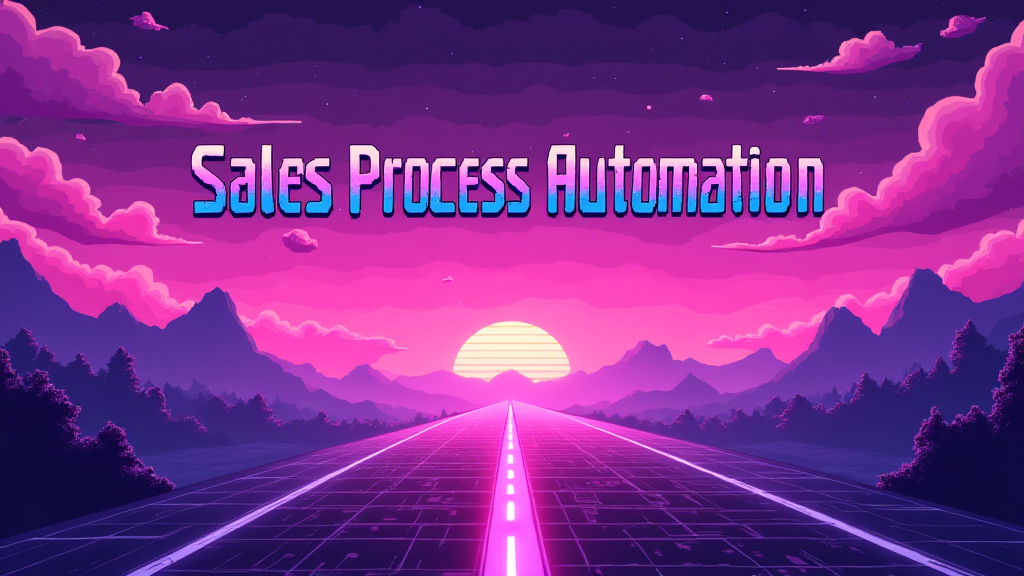Sales Process Automation: Streamline Your Sales

Published on: October 01, 2024
Sales Process Automation refers to the use of technology and software to streamline, optimize, and automate various stages of the sales cycle. This innovative approach eliminates manual, repetitive tasks, allowing sales teams to focus on high-value activities that drive revenue growth. 🚀
Why Sales Process Automation Matters
In today's fast-paced business environment, Sales Process Automation has become a crucial tool for organizations looking to gain a competitive edge. Here's why it's essential:
- Increased efficiency and productivity
- Improved lead quality and conversion rates
- Enhanced customer experience
- Better data accuracy and reporting
- Scalability for growing businesses
Key Components of Sales Process Automation
A comprehensive Sales Process Automation strategy typically includes the following elements:
1. Lead Generation and Qualification
Automated lead capture forms, scoring systems, and nurturing campaigns help identify and prioritize high-quality leads. 🎯
2. Contact and Account Management
Centralized databases and automated data entry ensure accurate and up-to-date customer information. 📊
3. Sales Pipeline Management
Automated tracking of deals through various stages, with alerts and reminders for follow-ups. 📈
4. Proposal and Quote Generation
Templated documents and automated pricing calculations streamline the proposal process. 📄
5. Order Processing and Fulfillment
Automated order entry, inventory checks, and shipping notifications improve efficiency. 📦
6. Analytics and Reporting
Real-time dashboards and automated reports provide insights for data-driven decision-making. 📊
Benefits of Sales Process Automation
Implementing Sales Process Automation can yield significant benefits for organizations:
| Benefit | Impact |
|---|---|
| Time Savings | Up to 50% reduction in time spent on administrative tasks |
| Lead Response Time | 5x faster response to leads |
| Sales Productivity | 30% increase in sales team productivity |
| Data Accuracy | 90% improvement in data quality |
Challenges and Best Practices
While Sales Process Automation offers numerous advantages, organizations may face challenges during implementation. Here are some best practices to overcome common hurdles:
- Start small: Begin with a pilot project to demonstrate value and gain buy-in
- Prioritize user adoption: Provide comprehensive training and support for sales teams
- Integrate systems: Ensure seamless data flow between CRM, marketing automation, and other tools
- Regularly review and optimize: Continuously refine automated processes based on performance data
- Maintain a human touch: Use automation to enhance, not replace, personal interactions with customers
Sales Process Automation Software
Several software solutions are available to help organizations implement Sales Process Automation. Popular options include:
- Salesforce Sales Cloud
- HubSpot Sales Hub
- Pipedrive
- Zoho CRM
- Microsoft Dynamics 365 Sales
When selecting a Sales Process Automation tool, consider factors such as scalability, integration capabilities, ease of use, and alignment with your specific business needs. 💻
The Future of Sales Process Automation
As technology continues to evolve, Sales Process Automation is expected to become even more sophisticated. Emerging trends include:
- AI-powered predictive analytics for sales forecasting
- Chatbots and virtual assistants for customer interactions
- Advanced personalization using machine learning algorithms
- Augmented reality for product demonstrations
By staying informed about these trends, organizations can position themselves to leverage the full potential of Sales Process Automation. 🔮
Implementing Sales Process Automation in Your Organization
To successfully implement Sales Process Automation, consider asking yourself the following questions:
- Which stages of our sales process are most time-consuming or prone to errors?
- What key performance indicators (KPIs) do we want to improve through automation?
- How can we ensure our sales team embraces and adopts new automated processes?
- What level of customization do we need in our Sales Process Automation software?
- How will we measure the ROI of our Sales Process Automation implementation?
By carefully considering these questions and following best practices, you can harness the power of Sales Process Automation to drive efficiency, productivity, and growth in your sales organization. 🚀
















